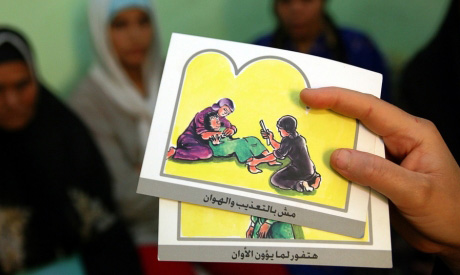
A counselor holds up cards used to educate women about female genital mutilation (FGM) in Upper Egypt- Minya (Photo: reuters).
Magdy Khaled, United Nations Population Fund (UNFPA) assistant representative officer, stated Thursday in a press conference in the UN premises in downtown Cairo, "We are working to incorporate health issues of FGM (female genital mutilation, or circumcision) in school syllabi, but its very hard, yet we are working on it."
Khaled's announcement comes in solidarity with the Egyptian Society of Gynecology and Obstetrics (ESGO) declaring its refusal of FGM in a statement issued 6 September.
ESGO's declaration comes amid social debate about FGM and calls to repeal the law prohibiting and criminalising its practitioners.
"There is a decision by the health minister that any doctor who performs such an act defies the precepts of normal medical practice and is criminalised by medical regulations," Ezz El-Din Osman, ESGO secretary, said.
Osman added that "teachers should be trained to teach such topics, since so many in schools refuse to teach the reproductive system chapter and tell students to view it at home."
Osman also urges the media to tackle the different reasons behind families subjecting young girls to FGM.
Philippe Daumelle, UNICEF representative, supports the ESGO statement, saying there is no medical or religious justification for the FGM practice.
Daumelle added: "Families who engage in this practice have no violent intention towards their children. It’s the act itself and its consequences" that is of concern.
Daumelle addressed the issue of improving the knowledge of the population, educating parents to understand better the consequences of the practice, so behavioral social change can lead to a better situation overall.
"It takes energy, time and political will from government, doctors, civil societies, UN and international agencies and media to inform and educate the population," Daumelle added.
Atef El-Shetany, secretary general of the National Population Council of Egypt (NPC), underlined that other Muslim countries like Saudi Arabia, Jordan and Kuwait do not adopt the practice. "We as individuals should decide not to do so, since it’s a violent act towards young girls," he said.
ESGO's declaration reads: "Physicians, nursing staff and others should never perform any cutting, leveling or modification of any normal anatomical part of the female genital organs in governmental or non-governmental hospitals or any other place. Anyone who performs this operation is violating the laws and bylaws that regulate the medical profession."
The ESGO declaration is issued in response to FGM awareness campaigns sent to villages and rural areas where doctors perform female circumcisions.
The declaration of ESGO explained that gynecologists have a responsibility towards the physical, psychological and sexual health of Egyptian woman.
The declaration also urges gynecologists to explain the immediate and long term dangers of FGM to legislators, policymakers and community leaders and teachers.
Short link: